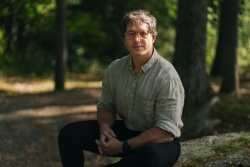Lectures & Lecturers
Lee

9:30am - 10:30am - Data assimilation for Geophysical Fluid Systems - Prof. Yoonsang Lee
Lee

Numerical weather prediction integrates observational data to enhance the accuracy of forecasts for geophysical fluid systems. Developing a reliable and precise prediction method requires two key components: (i) high-fidelity prediction models and (ii) scalable approaches to data assimilation. This lecture will address these challenges through the framework of stochastic processes, applied to both the prediction models and the assimilation techniques. Specifically, we will explore the concept of high-fidelity models within the context of Bayesian inference. Interestingly, the traditional numerical analysis perspective on high accuracy can be misleading in the Bayesian framework. Highly accurate prediction models can overemphasize inherent biases in the model, leading to overly confident predictions. Instead, we will demonstrate how stochastic modeling offers the statistical flexibility needed to account for noisy and incomplete observational data. The lecture is designed to be accessible to students with some background in probability, stochastic processes, and basic numerical linear algebra.
Klaus

10:30am - 11:30am -
Managing the risks of climate tipping points - Prof. Klaus Keller
Klaus

The coupled natural-human systems can react abruptly to anthropogenic forcings (sometimes referred to as tipping-point responses). The nonlinearity, abruptness, and hysteresis of the response poses nontrivial challenges to analyze and manage the coupled natural-human systems. This session reviews frameworks (i) to analyze past and project potential future tipping point responses and (ii) to support decisions to navigate synergies and trade-offs driven by tipping point responses.
Papers relevant to the talk:
Prof. Keller Abrupt Climate Change.pdf
Prof. Keller Adaptive.Mitigation Strategies. hedge against extreme climate features.pdf
Prof. Keller Climate Risk Management.pdf
Prof. Joanna Slawinska

1pm - 2pm - Nonparametric Modeling and Analysis of Geophysical Flows (and other complex systems) using Quatum-Inspired Approaches to Nonlinear Dynamics - Prof. Joanna Slawinska
Prof. Joanna Slawinska

This talk will provide an overview of recent research conducted by our group in the Department of Mathematics at Dartmouth College, focusing on data-driven operator-theoretic approaches to modeling nonlinear dynamical systems. A central theme of this work is the development of Koopman-based frameworks, enriched with kernel methods and delay-coordinate embeddings, for analyzing and forecasting complex spatiotemporal behavior.
The group has developed empirical methods to approximate infinite-dimensional evolution operators with finite-dimensional matrix representations, enabling spectral decomposition and interpretable modeling in a learned observable space. Extensions to vector-valued observables allow for the analysis of multivariate and coupled systems, facilitating the extraction of dominant spatiotemporal patterns without relying on intrusive solvers or governing equations.
A more recent direction introduces a quantum-inspired formulation, where evolving system states are represented by data-driven density operators, and observables evolve under Koopman dynamics analogous to Heisenberg evolution. This formulation supports nonparametric data assimilation and incorporates uncertainty quantification in a natural way.
Our framework has proven particularly well suited for partially observed systems and those where first-principles models are unavailable, such as in climate and atmospheric dynamics. It also offers tools for constructing subgrid-scale parameterizations and closure models by learning the influence of unresolved dynamics directly from data.
The group is currently exploring quantum-like computational platforms for implementing these methods, leveraging their operator structure to align with emerging quantum architectures for scalable dynamical modeling.
In closing, we will reflect on the relevance and promise of these approaches in geoscientific applications—including climate science—as well as their potential across a broader range of complex systems studied by our group.
Mankin

2pm - 3pm - Constraining Uncertainty in the Human Impacts of Climate Change - Prof. Justin Mankin
Mankin

How will climate change affect people and the things they value? Drawing on examples from violent conflict, economic growth, and water resources, I highlight my research to inform society's management of climate risks, with implications for everything from drought monitoring to climate liability. My work looks retrospectively, documenting the impacts that have already unfolded, and prospectively, helping to anticipate the ones to come. Across all of this work, I discuss my effort to (1) meaningfully connect geophysical changes with human consequences, (2) quantify, attribute, and constrain uncertainty, especially given structural data inequities, and (3) inform model design and analysis choices to ensure that scientific answers about our present and future are sound, transparent, reproducible, useful, and just. Collectively, my research and that of my group demonstrates the importance of science that spans both fundamental and applied questions of climate impacts to inform adaptations and prepare society for a warmer world.